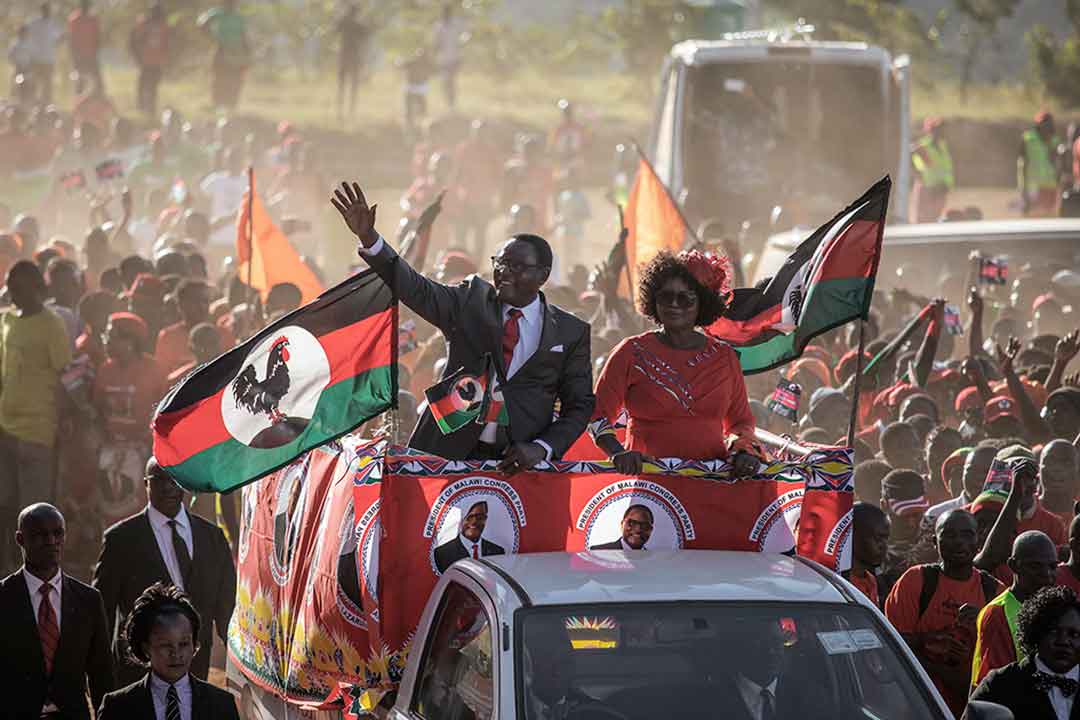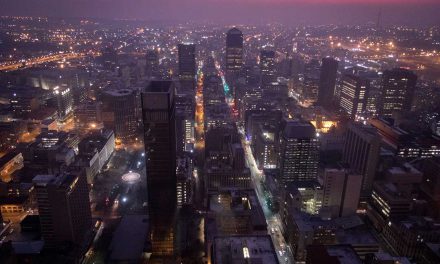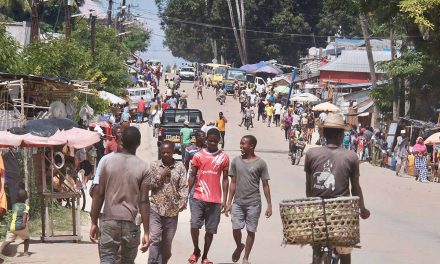
(FILES) In this file photo taken on May 18, 2019 opposition Malawi Congress Party (MCP) leader and presidential candidate Lazarus Chakwera (L) waves to the crowd as he arrives at the last campaign rally, in Lilongwe, ahead of general elections. – Chakwera on June 27, 2020 was declared winner of this week’s presidential election re-run with 58.75 percent of the vote according to the electoral commission said, AFP reports. (Photo by GIANLUIGI GUERCIA / AFP)
Late on Saturday 27 June, 2020, the Malawi Electoral Commission (MEC) Chairperson, Justice Chifundo Kachale, formally announced the election results. Dr Lazarus Chakwera of the Malawi Congress Party (MCP) had won the election with 58.57% of the vote. Chakwera received 2.6 million votes, while incumbent President Arthur Peter Mutharika of the Democratic Progress Party (DPP) received 1.75 million votes (39.4%). The voter turnout was 64.8%. This election comes after a year-long battle for the independence of Malawi’s democratic institutions, and should be seen as an important milestone in the movement towards democratic consolidation on the continent. It also provides a host of potential lessons for both policymakers and activists at the local, regional, and international level, on how to best support developing nations in times of constitutional crisis.
Malawi’s Constitutional Court had struck down the previous election results, citing widespread irregularities, including the use of correction fluid on ballots. The court was harshly critical of the manner in which the MEC handled the May 2019 election, finding the former Chairperson, Jane Ansah, and her commissioners incompetent. The election results triggered months of nationwide protests, calling for new elections and demanding Ansah’s removal. Mutharika responded by appointing Justice Kachale, who vowed the rerun election would be free, fair and credible.
The voter turnout in May 2019 was 77.4%. Mutharika won 38.57% of the vote, against Chakwera’s 35.41%. Chakwera and his Vice President, Dr Saulos Chilima (United Transformation Movement), together achieved more than they did individually in the previous election when they both stood as independent candidates, thus validating their decision to run on the same ballot ticket. Both Chakwera and Mutharika had allied with other parties. Chakwera’s alliance with Chilima was supported by most other opposition parties and was called Tonse Alliance (“all of us” in the local Chichewa language). Mutharika had formed an alliance with Atupele Muluzi (United Democratic Front). The election result divides the country into two with the MCP-UTM alliance gaining a majority in all districts of the northern and central provinces, while the DPP-UDF alliance gained a majority in all districts of the southern province.
In his official announcement, Justice Kachale was careful to clarify that all complaints they had received were handled at the local level of election staff at the polling stations, with the exception of one complaint, which had to be elevated to the national level. The MEC stated it had received dozens of complaints in the days following the election, most from the outgoing DPP government. Their complaints related to instances of violence against party representatives and safety concerns at some of the polling stations. The complaints of violence were considered criminal, and were dispatched to the police for further investigation. The complaints concerning security for party representatives at the polling stations were rejected, citing that security arrangements had been well taken care of by the military and the police.
Outgoing President Mutharika addressed the nation on Saturday afternoon where he implicitly accepted his defeat. However, this did not stop him from characterising the rerun as the worst election in Malawi’s history before urging the people to accept the results of the MEC and the country to move on as one Malawi and one people.
Implications
The impact of this election process, both on the region and the continent, should not be downplayed.
It is only the second time on the continent where the judiciary has overturned a presidential election and called for a fresh election. The first was in Kenya in 2017, but saw the opposition boycotting the rerun election. In Malawi, there was full participation of all political parties. Doubts were raised about the timing of the rerun election, and lack of international assistance and international observers. Contrary to these doubts, the rerun election process appears to have been largely positive, with the MEC ensuring transparency and verification, thus legitimising the outcome.
While there were no international observers present, invitations had been sent but could not be honoured due to tight time constraints. Travel restrictions, quarantine rules and health considerations in connection with the COVID-19 pandemic also impacted the non-attendance of international observers. However, embassies, the UN and international organisations with a presence in the country were accredited as observers. There were also national election observers from about 20 different local stakeholders, including civil society organisations, ecclesiastical organisations, human rights organisations and academia. Most were in agreement that the rerun election process and results were legitimate.
Lessons learned
An important lesson to be taken from this election process is the manner in which the Malawians adopted a “home-grown ownership” of this election process. While the international community had raised concerns about the country’s ability to hold elections in a free, fair, transparent and credible manner, Malawi proved that it could be done successfully. Malawi should be commended for the manner, under very trying circumstances, in which it conducted a credible rerun election.
A major positive long-term effect that the “legal miracle” relating to this rerun election process will have on the region will be the imbedding of the idea that it is possible to trust the judiciary to be professional and independent. An important legal precedent has been set that should find some footing in courts across the region. This important precedent, overriding the May 2019 election results, may act as a catalyst to embolden regional activists, lawyers and democracy advocates in other countries in dealing with issues of poor governance and instances of perceived electoral fraud. The outcome of the court judgment may be indicative of the further consolidation of democracy and good governance in Malawi.
A further lesson from Malawi’s election rerun relates to the finalisation of election reports produced by international observer teams. In hindsight, their observation processes can be criticised as most observers compile their reports based on the formal framework of the election, including the pre- and post-election periods. However, the major contestation arose from the counting process itself. Once the results had been tallied, most observers had either left the country or completed their deployment and had submitted their election observation reports. As a result, the endorsing election observation reports unwittingly created the misconception that the election was held in a free, fair, transparent and credible manner and was used as a justification by Mutharika to endorse his flawed election victory. Thus, it may be argued, the international election observers may have contributed to the polarised situation that followed. With regards to upcoming elections in the region, election observer missions should study the Malawian case carefully to gather important lessons for future election observer deployments.











This is a great blog.
Good Day,
Many thanks for your response and your kind words. Kindly keep an eye on our page for more*
I love reading your site.
Good Day,
Many thanks for your response and your kind words. Kindly keep an eye on our page for more*
Amazin!
Good Day,
Many thanks for your response and your kind words. Kindly keep an eye on our page for more*
Great news once again!
Good Day,
Many thanks for your response and your kind words. Kindly keep an eye on our page for more*
I love reading your site.
Good Day,
Many thanks for your response and your kind words. Kindly keep an eye on our page for more*
Great news once again!
Good Day,
Many thanks for your response and your kind words. Kindly keep an eye on our page for more*
This is a great blog.
Good Day,
Many thanks for your response and your kind words. Kindly keep an eye on our page for more*
Amazin!
Good Day,
Many thanks for your response and your kind words. Kindly keep an eye on our page for more*
I love reading your site.
Good Day,
Many thanks for your response and your kind words. Kindly keep an eye on our page for more*
That is the right blog for anyone who needs to search out out about this topic. You realize a lot its virtually exhausting to argue with you (not that I actually would want…HaHa). You undoubtedly put a brand new spin on a topic thats been written about for years. Nice stuff, just great!
Hi Rick,
Many thanks for your response and your kind words. Kindly keep an eye on our page for more*
We are a group of volunteers and starting a new scheme in our community. Your website offered us with valuable information to paintings on. You have performed an impressive job and our whole community shall be grateful to you.
Hi Leo,
Many thanks for your positive and kind words. We are glad we could assist, kindly keep an eye on our page for future articles and opinion pieces*
We’re a group of volunteers and starting a new scheme in our community. Your website offered us with valuable information to work on. You have done an impressive job and our whole community will be thankful to you.
Hi Dana,
Many thanks for your kind and positive words. Kindly keep an eye on our page for future articles*
I want to express my passion for your generosity for those individuals that must have guidance on this important area of interest. Your personal commitment to passing the solution all through became really good and have surely empowered most people like me to reach their endeavors. Your personal important guidelines signifies a lot a person like me and still more to my colleagues. Thank you; from each one of us.
Good Day,
Many thanks for your support and your kind words. Kindly keep an eye on our website for future opinion pieces*
Good post however I was wanting to know if you could write a litte more on this topic? I’d be very grateful if you could elaborate a little bit more. Thank you!
Good Day,
Many thanks for your response. Based on the topic, what would you like elaborated for further assistance?
Hi there, You’ve done an excellent job. I’ll certainly digg it and personally recommend to my friends. I’m sure they’ll be benefited from this site.
Hi Blake,
Many thanks for your response and your kind words. Kindly keep an eye on our page for more*
Excellent web site. A lot of useful info here. I am sending it to a few friends ans additionally sharing in delicious. And naturally, thanks in your sweat!
Hi Tuan,
Many thanks for your positive and kind words. Kindly keep an eye on our page for future articles and opinion pieces*
What’s Taking place i am new to this, I stumbled upon this I have found It absolutely helpful and it has helped me out loads. I’m hoping to contribute & help different users like its helped me. Good job.
Hi Marcella,
Many thanks for your positive and kind words. Kindly keep an eye on our page for future articles and opinion pieces*
I’m still learning from you, but I’m trying to achieve my goals. I definitely liked reading everything that is posted on your blog.Keep the aarticles coming. I enjoyed it!
Hi Joel,
Many thanks for your positive and kind words. Kindly keep an eye on our page for future articles and opinion pieces*
I’ve learn some just right stuff here. Definitely worth bookmarking for revisiting. I surprise how much effort you set to make such a fantastic informative site.
Hi Antoine,
Many thanks for your positive and kind words. Kindly keep an eye on our page for future articles and opinion pieces*
I appreciate, cause I found just what I was looking for. You’ve ended my 4 day long hunt! God Bless you man. Have a great day. Bye
Hi Chang,
Many thanks for your positive and kind words. Kindly keep an eye on our page for future articles and opinion pieces*
An interesting dialogue is worth comment. I think that it’s best to write more on this subject, it may not be a taboo subject but usually people are not sufficient to speak on such topics. To the next. Cheers
Hi Eduardo,
Many thanks for your positive response and comment. Kindly keep an eye on our future articles and opinion pieces*
I do trust all of the ideas you have presented on your post. They’re very convincing and can definitely work. Nonetheless, the posts are too brief for novices. Could you please lengthen them a little from subsequent time? Thanks for the post.
Hi Edison,
Many thanks for your positive and kind words. Kindly keep an eye on our page for more*
I’m impressed, I have to say. Actually hardly ever do I encounter a blog that’s both educative and entertaining, and let me inform you, you will have hit the nail on the head. Your idea is outstanding; the problem is one thing that not enough individuals are speaking intelligently about. I am very completely happy that I stumbled across this in my search for one thing regarding this.
Hi Galen,
Many thanks for your positive and kind words. Kindly keep an eye on our page for future articles and opinion pieces*
Greetings! This is my first visit to your blog! We are a group of volunteers and starting a new project in a community in the same niche. Your blog provided us beneficial information to work on. You have done a marvellous job!
Hi Bradley,
Many thanks for your support and kind words. Keep an eye on our page for future articles and opinion pieces*
It is best to take part in a contest for among the best blogs on the web. I’ll suggest this site!
Hi Davis,
Many thanks for your support and kind words. Keep an eye on our page for future articles and opinion pieces*